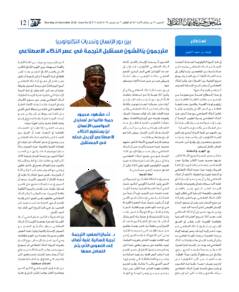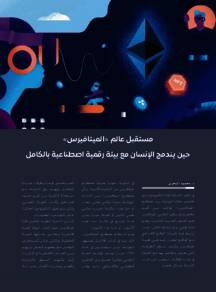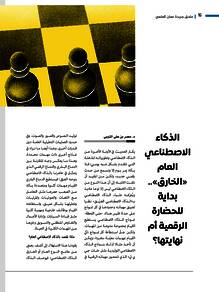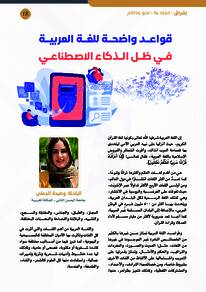Document
تأثير استخدام تطبيقات الذكاء االصطناعي على الخصوصية الرقمية للأفراد والمؤسسات في سلطنة عمان.
Identifier
الشهومية, ابتسام بنت سعيد بن علي (2020). تأثير استخدام تطبيقات الذكاء االصطناعي على الخصوصية الرقميةللأفراد والمؤسسات في سلطنة عمان (رسالة ماجستير، جامعة السلطان قابوس،مسقط، عمان).
Publisher
جامعة السلطان قابوس.
Gregorian
2020
Language
Arabic
English abstract
The current study aimed to identify the reality and fields of using artificial intelligence applications in institutions in the Sultanate of Oman, identify the mechanism for verifying digital identity in institutions in the Sultanate, shed light on the ethical implications of artificial intelligence applications on digital privacy as well as digital identity of individuals and
institutions, and also to identify legal, technical, regulatory measures taken in the Sultanate of Oman to protect privacy and reduce identity theft. The study adopted the qualitative approach by using three focus groups. It also was based on eight semi-structured interviews, used as tools for data collection. The study population included governmental and private
institutions that have already started using artificial intelligence applications to perform their work. It also included institutions concerned with following up and monitoring breaches and violations resulting from the use of modern technologies, as well as institutions concerned with developing regulatory and legislative regulations to ensure the protection of individuals' data and
rights The study sample was intentionally chosen. It consisted of six institutions, four of which are governmental and they are: Ministry of Technology and Communications, Royal Oman Police, the National Center for Statistics and Information, the Public Prosecution. The other two were private institutions represented by Bank Muscat and four attorneys' offices.
The study found a set of results. The most prominent of which is that the Sultanate is keen to attract artificial intelligence technologies, believing in its role in improving the quality of services provided and strengthening the
Omani economy. However, the Sultanate is still in the initial stage of using and activating artificial intelligence techniques.
The results also showed the diversity of areas and purposes of using artificial intelligence techniques in the Sultanate, such as: data analysis for future indicators, investment of time and reduction of operating costs, support for the educational process, organizing conferences, and others. The COVID-19 pandemic in the country has enhanced use of artificial intelligence techniques to reduce the effects of the pandemic and limit the spread of the disease. The results showed that some major companies use artificial intelligence applications to violate privacy and infringe on users' data by analyzing and selling them to other institutions to achieve political goals or make a profit. This resulted in a set of ethical issues that have a negative impact on
individuals and society. The results also showed the Sultanate's interest in taking a set of technical, legislative and regulatory measures to ensure that data is protected in a safe environment and that users' privacy is preserved and not violated. Accordingly, the rate of ethical issues the Sultanate may face as a result of using artificial intelligence applications was reduced, the same as the rest of the world. The study concluded with a group of recommendations, the most
important of which are: The need to consider the integration of current legislations and update them in line with modern technological developments to protect data and limit violations of privacy by issuing a law dealing with technical crimes resulting from the use of artificial intelligence applications. Besides, the need to create an integrated program for employees in governmental institutions aim to raise the level of technical, legislative, and organizational awareness in dealing with modern and advanced technologies.
Member of
Resource URL
Arabic abstract
هدفت الدراسة الحالية إلى التعرف على واقع استخدام تطبيقات الذكاء االصطناعي ومجاالته في المؤسسات في سلطنة عمان، والتعرف على آلية التحقق من الهوية الرقمية فيها، وتسليط الضوء على اآلثار األخالقية لتطبيقات الذكاء االصطناعي على الخصوصية الرقمية، والهوية الرقمية لألفراد والمؤسسات، والتعرف على التدابير القانونية والتقنية والتنظيمية التي اتخذتها سلطنة عمان لحماية الخصوصية والحد من سرقة الهوية. اعتمدت الدراسة المنهج النوعي، واستخدمت مجموعات التركيز التي بلغ عددها ثالث مجموعات، والمقابالت شبه المقننة التي بلغ عددها ثمان مقابالت كأدوات لجمع البيانات. شمل مجتمع الدراسة المؤسسات الحكومية والخاصة التي بدأت بالفعل باستخدام تطبيقات الذكاء االصطناعي في أداء أعمالها، والمؤسسات المعنية بمتابعة ومراقبة االختراقات واالنتهاكات الناتجة عن استخدام التقنيات الحديثة، والمؤسسات المعنية بوضع اللوائح التنظيمية والتشريعية لضمان حماية بيانات وحقوق األفراد. وقد تم اختيار عينة الدراسة بشكل قصدي، وتألفت من ستة مؤسسات؛ منها أربع مؤسسات حكومية، وهي: وزارة التقنية واالتصاالت، وشرطة عمان السلطانية، والمركز الوطني لإلحصاء والمعلومات، واالدعاء العام، ومؤسستان خاصة؛ تمثلت في بنك مسقط وأربعة مكاتب محاميين. توصلت الدراسة إلى مجموعة من النتائج أبرزها: حرص السلطنة على استقطاب تقنيات الذكاء االصطناعي، إيمانًا منها بدورها في تحسين جودة الخدمات المقدمة، وتعزيز االقتصاد العماني، وما زالت السلطنة في المرحلة األولية الستخدام تقنيات الذكاء االصطناعي وتفعيلها. كما أوضحت النتائج تنوع مجاالت وأغراض استخدام تقنيات الذكاء االصطناعي في السلطنة، مثل: تحليل البيانات للمؤشرات المستقبلية، واستثمار الوقت وخفض تكاليف التشغيل، ودعم العملية التعليمية وتنظيم المؤتمرات وغيرها. وساهمت جائحة 19-COVID التي تمر بها السلطنة في زيادة تفعيل استخدام تقنيات الذكاء االصطناعي لتقليل اآلثار الناجمة عن الجائحة، والحد من انتشار المرض. وأوضحت النتائج عن قيام بعض الشركات الكبرى في استخدام تطبيقات الذكاء االصطناعي في انتهاك الخصوصية، والتعدي على بيانات المستخدمين عن طريق تحليلها وبيعها لمؤسسات أخرى لتحقيق أهداف سياسية أو تحقيق ربح مادي، مما نتج عنه مجموعة من القضايا األخالقية من شأنها أن تؤثر تأثي ًرا سلبيًا على الفرد والمجتمع. كما أظهرت النتائج اهتمام السلطنة باتخاذ مجموعة من التدابير التقنية والتشريعية والتنظيمية لضمان حماية البيانات في بيئة آمنة والحفاظ على خصوصية المستخدمين وعدم التعدي عليها، وهو ما أسهم في خفض نسبة القضايا األخالقية التي قد تواجه السلطنة نتيجة استخدام تطبيقات الذكاء االصطناعي حالها كحال بقية دول العالم. خلصت الدراسة إلى جملة من التوصيات من أهمها: ضرورة النظر في تكامل التشريعات الحالية وتحديثها بما يتناسب مع التطورات التقنية الحديثة لحماية البيانات من خالل إصدار قانون يختص بالتعامل مع الجرائم التقنية الناتجة عن استخدام تطبيقات الذكاء االصطناعي، وضرورة إيجاد برنامج متكامل للعاملين في المؤسسات الحكومية يهدف إلى رفع مستوى الوعي التقني، التشريعي، والتنظيمي في التعامل مع التقنيات الحديثة والمتطورة
Category
Theses and Dissertations







